Each year, the World Economic Forum (WEF) publishes a series of studies that can help readers easily determine how their country is progressing or regressing.
One of these studies focuses on which economies are competitive and which economies are doomed to remain in the margins of civilization. In fact, the big word "competitiveness" means, according to the WEF experts, only the ability of the state to effectively use its resources. At the same time, many parameters are taken into account, ranging from the work of state institutions, the degree of infrastructure development, the opportunity to receive medical care, education, good work, and ending with the level of technology and the state of the domestic and international markets.
In total, 141 countries participated in the ranking of the most competitive economies in the world in 2019. And this is what the top ten looks like.
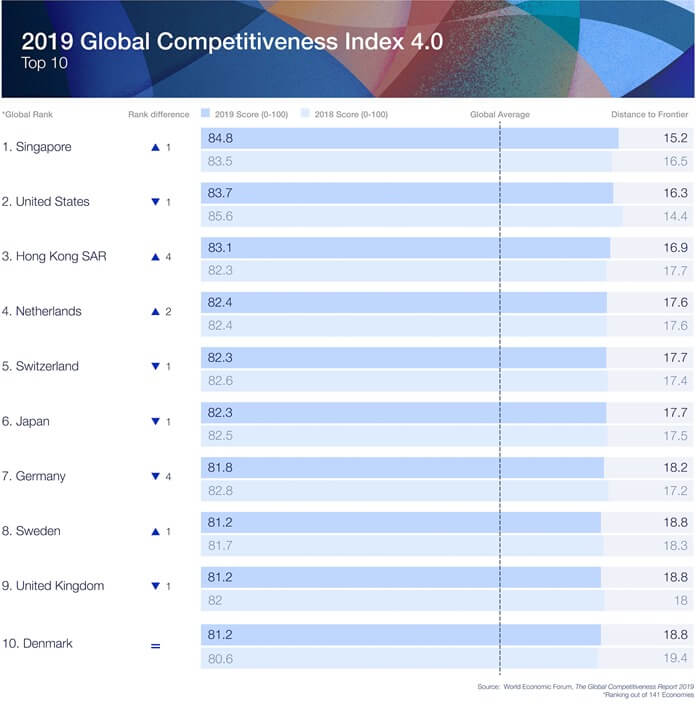
10. Denmark
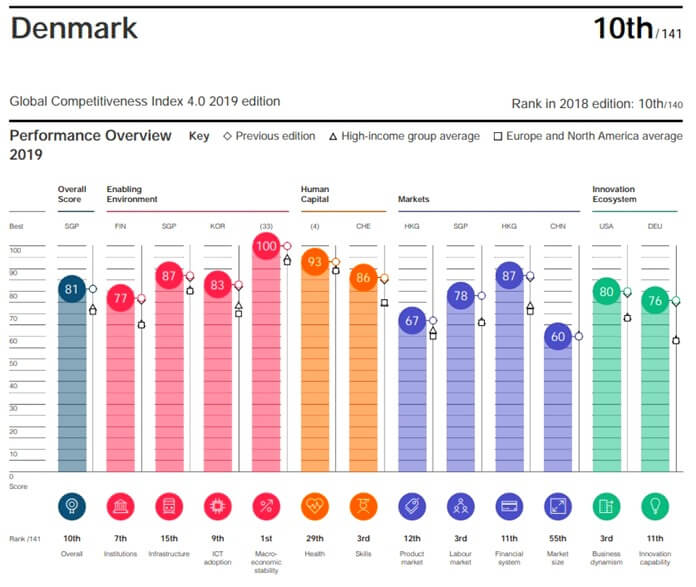 Rating: 81.2
Rating: 81.2
The top ten most competitive economies in the world are opened by a representative of Scandinavia. The gap from its predecessor is small: Finland, which is in 11th place, is only 1 point behind.
Although Denmark's domestic market is the smallest in Europe, the country is reaching the top with a labor market that is both flexible and efficient and protects its citizens from exploitation. She has high indicators in such indicators as the level of education and training, the dynamism of business and public institutions, as well as first place in macroeconomic stability.
9.UK
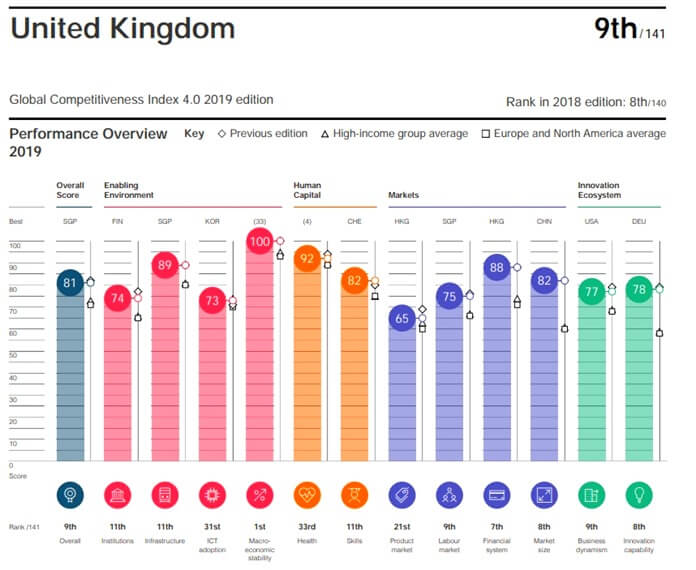 Rating: 81.2
Rating: 81.2
The long-running Brexit (that is, the country's exit from the European Union) did not affect the state of affairs in England. It still holds a leading position in terms of macroeconomic stability (first place), innovation (eighth place) and booming business (also eighth).
However, according to experts, "Brexit" will inevitably affect the economic situation in the country negatively, so the government will have to compensate for this. For example, to extend fiber to every home, since the British have less internet access than many developing countries. In terms of the introduction of information technologies, England is inferior even to Russia (31st place against 22nd, respectively).
8. Sweden
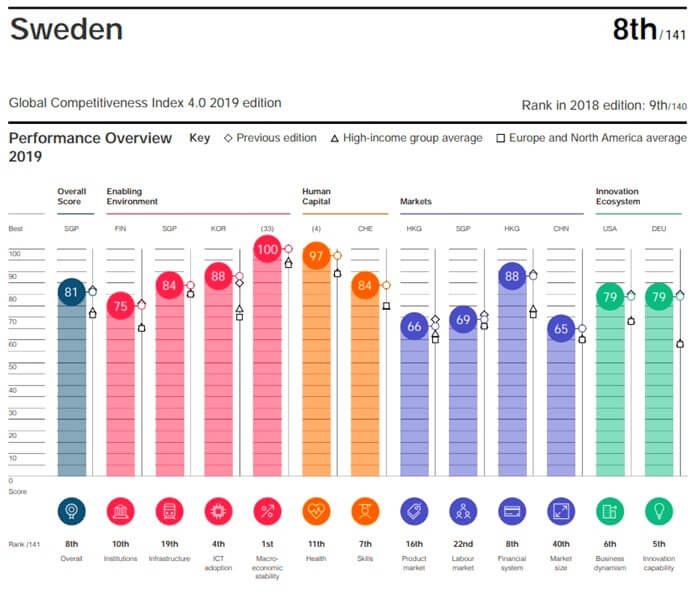 Rating: 81.2
Rating: 81.2
Another Scandinavian country is leading in terms of macroeconomic stability, and also ranks 4th, 5th and 6th in IT development, innovation potential and business dynamics, respectively.
In terms of the development of the Internet and mobile communications, Sweden came out on top among all European countries participating in the ranking. More than 80.6 percent of the Swedish adult population regularly browses the world wide web.
In addition to providing its citizens with communication, the Swedish government helps them get education and training (seventh in the world) and cares for their health (11th).
7. Germany
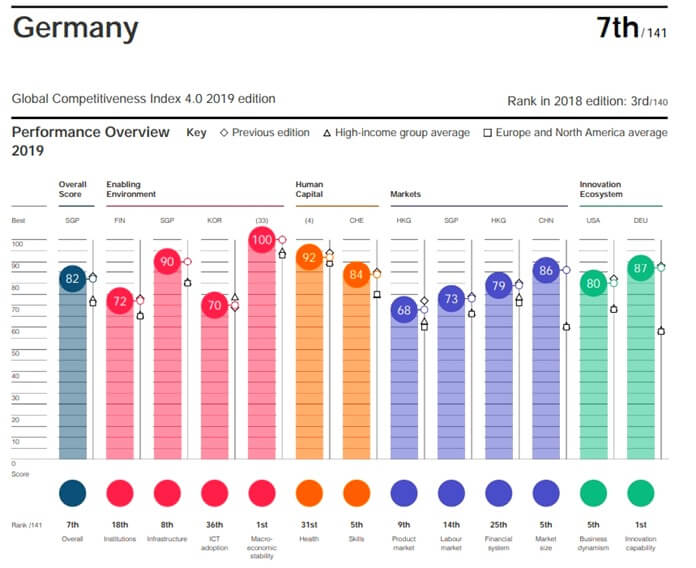 Rating: 81.8
Rating: 81.8
Germany's seventh place in the ranking is due, first of all, to high macroeconomic stability and the level of development of its innovations.
- It ranks fifth in the world by the number of issued patents;
- for scientific publications - the third;
- according to the conducted research - the fourth.
And German companies are constantly competing among themselves, which of them is more advanced, which undoubtedly has a positive effect on the climate in the country as a whole. Moreover, innovations in Germany are instantly put into circulation, which allows the country to take second place in the world in terms of the number of innovations introduced into the production sphere.
The triumphant march of Germany on the way to the first place is hampered by the low indicators of the development of the financial system (in comparison with other countries from the top ten), health and the introduction of information technologies. For example, in terms of the number of fiber-optic cables extended to homes, the country of beer and sausages is not even included in the top 50.
6. Japan
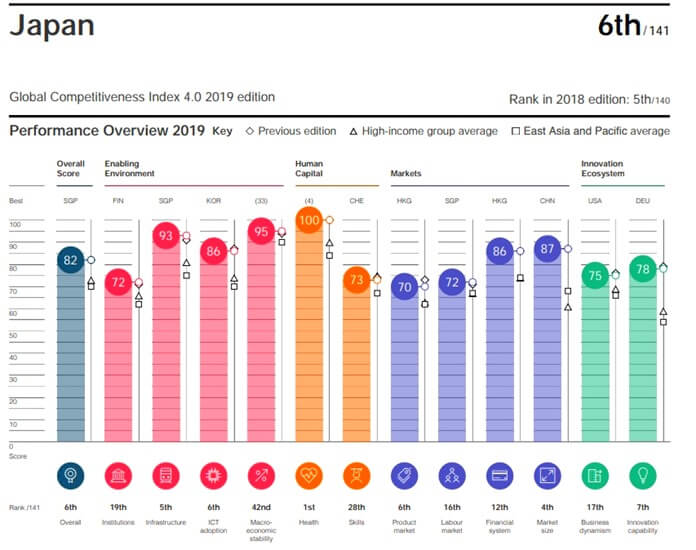 Rating: 82.3
Rating: 82.3
The Land of the Rising Sun leads in health care (first in the world) and also ranks high in terms of infrastructure development and market size. It is in sixth place in terms of the introduction of information technologies.
The majority of the adult population of Japan (93%) use the Internet on a regular basis, and the country ranks third in the world in terms of the number of Internet cables stretched across the country. This figure looks especially impressive when you consider the size of Japan.
The country's development is hindered by rigid institutions of power, a low level of macroeconomic stability, and from the point of view of an entrepreneurial culture - fear of risks and a weak level of creativity. However, unlike other Asian countries participating in the ranking, innovation in Japan is encouraged.
5. Switzerland
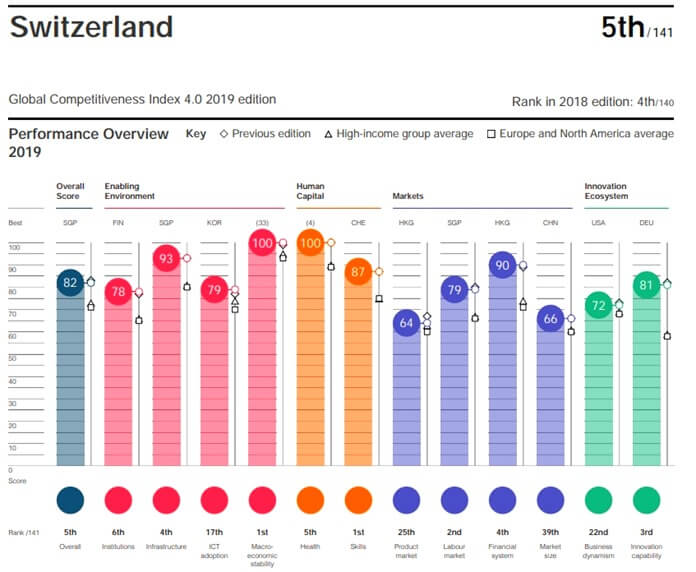 Rating: 82.3
Rating: 82.3
The country's strengths are the quality of education, macroeconomic stability and commitment to innovation. The country hosts the headquarters of the largest international corporations that encourage and use these innovations in every possible way.
In addition to innovation, the compilers of the competitiveness rating of the countries of the world note organizational structures that contribute to the development of science and technology, first-class transport and communal infrastructure, high quality healthcare, and a well-functioning labor market.
The disadvantages of the country are the desire of the Swiss to handle their affairs behind closed doors of their offices. And the size of the Swiss market is not too large, or Russia is the case.
4. Netherlands
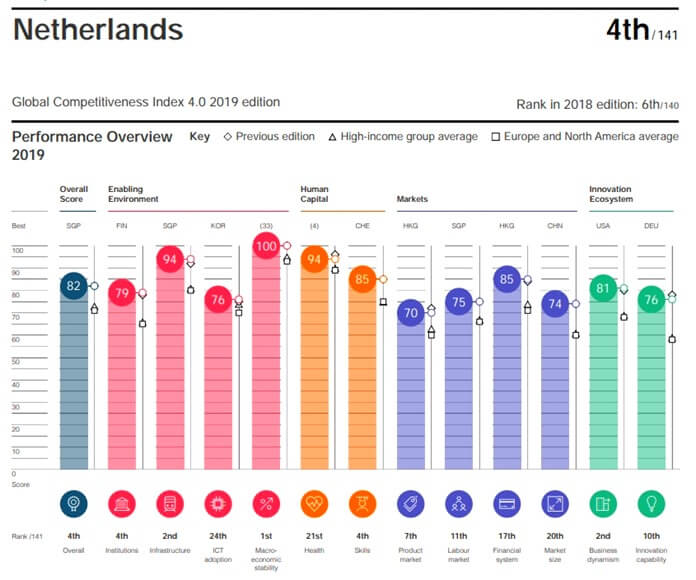 Rating: 82.4
Rating: 82.4
Everything is good in this country - from infrastructure to business dynamism. A very strong side of the Netherlands is effective and transparent institutions of government, the actions of which any citizen can learn about (including what the state spends money on).
In addition to its openness and transparency, the Netherlands is known for its freedom of speech, property rights protection and a strong ethical component of national politics.
At the same time, doing business in the country is not just easy, but very easy, as well as getting a higher education. And in terms of macroeconomic stability, the country scored 100 points out of 100.
However, like any country, the Netherlands also has weaknesses. This is the introduction of information technology (24th place) and healthcare (21st place).
3. Hong Kong
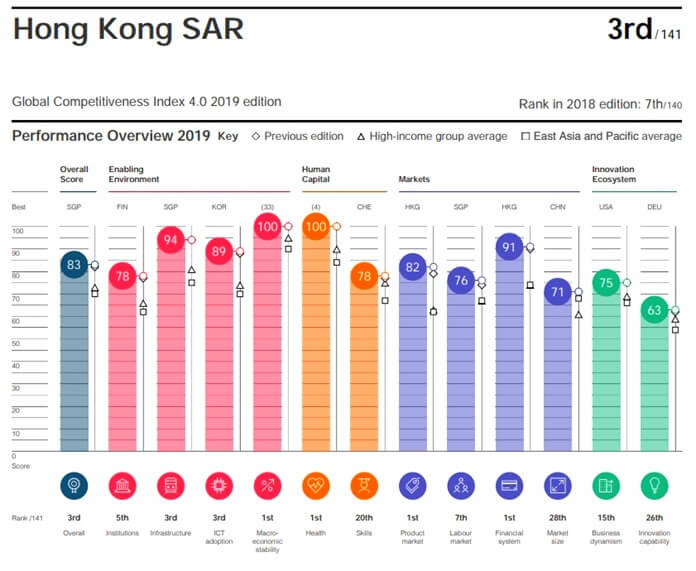 Rating: 83.1
Rating: 83.1
The second, but not the last representative of Asia in the top 10 most competitive economies in the world. Although in a purely legal sense of the word "country" this territory cannot be called. Now it has a special status under the protectorate of the PRC, and Hong Kong will cease to exist independently by 2047.
Overall, Hong Kong's economic profile is very similar to Singapore's. Both of these city-states stand out in terms of macroeconomic stability, a well-functioning financial system, an efficient market for goods and services, and excellent infrastructure. In addition, Hong Kong has a very responsible approach to the health of the population, and according to this criterion, the city ranks first.
The weak link in Hong Kong's economy is its extremely cautious approach to innovation. Restrictions on press freedom also hinder the development of Hong Kong's competitiveness.
2. USA
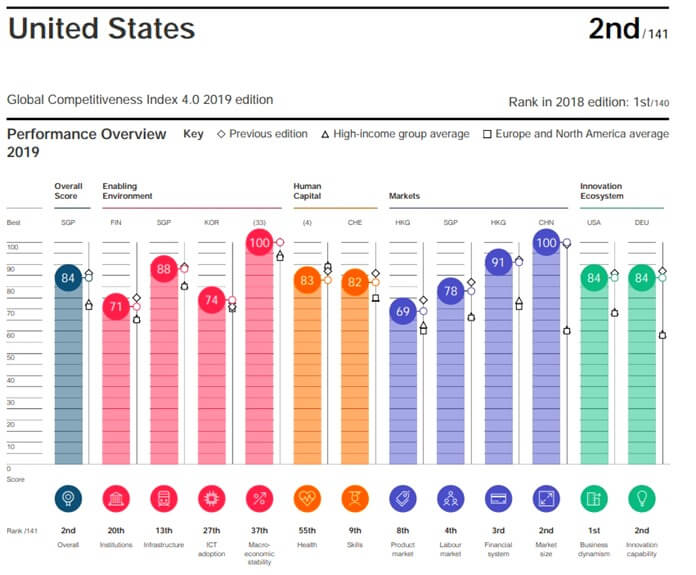 Rating: 83.7
Rating: 83.7
In second place, behind the most competitive economy in the world by 1.1 points, is the United States of America.
In what the country has no equal, it is in the dynamics of business development (first place), the scale of the market (second place), the level of innovation (second place) and an established financial system (third place).
However, this business paradise has its tigers - macroeconomic stability and healthcare. According to these indicators, the United States occupies 37 and 55 places, respectively.
Unsurprisingly, Americans are not too happy - the country's suicide rate is five times higher than the average for advanced economies.
1. Singapore
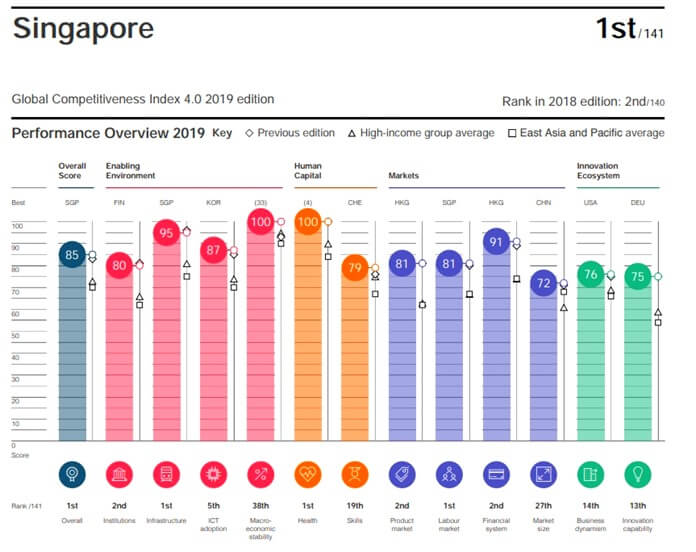 Rating: 84.8
Rating: 84.8
First place in countries competitiveness ranking and the world's economies in 2019 went to Singapore.
The reason for this high position in the ranking is the country's maximum performance in three out of ten key parameters: health care, infrastructure and labor market efficiency.
A significant competitive advantage of Singapore is a vast and completely open market for third-party investors, transparency of public institutions, and an excellently developed infrastructure. As for the life of ordinary citizens, here too Singapore is in the top ten, in terms of life expectancy it even surpassed Japan.
To achieve the status of a world leader, the country will first have to solve a number of problems: deal with the bad environmental situation, give business more dynamism and pay more attention to macroeconomic stability.
Where is Russia here?
Among the countries of the former USSR, Russia is second only to the Baltic countries. As in the case of last year's rating, our country is in 43rd place.
Cautious optimism inspires good performance in such parameters as:
- market size - 6th line;
- IT implementation - 22nd position;
- innovative potential - 32nd line;
- macroeconomic stability - 43rd line;
- and infrastructure - 50th place.
More or less good are things with business dynamics (53rd line) and higher education and vocational training (54th place).
But in terms of public institutions (74th position), the efficiency of the market for goods and services (87th position), the development of the financial system (95th position) and, in particular, health (97th line), our country lags far behind most competitive countries in 2019.
And Chad is the most uncompetitive economy in the world.

